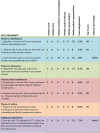International consensus: ovarian tissue cryopreservation in young Turner syndrome patients: outcomes of an ethical Delphi study including 55 experts from 16 different countries
- PMID: 32348471
- PMCID: PMC7493129
- DOI: 10.1093/humrep/deaa007
International consensus: ovarian tissue cryopreservation in young Turner syndrome patients: outcomes of an ethical Delphi study including 55 experts from 16 different countries
Abstract
Study question: What is the standpoint of an international expert panel on ovarian tissue cryopreservation (OTC) in young females with Turner syndrome (TS)?
Summary answer: The expert panel states that OTC should be offered to young females with TS, but under strict conditions only.
What is known already: OTC is already an option for preserving the fertility of young females at risk of iatrogenic primary ovarian insufficiency (POI). Offering OTC to females with a genetic cause of POI could be the next step. One of the most common genetic disorders related to POI is TS. Due to an early depletion of the ovarian reserve, most females with TS are confronted with infertility before reaching adulthood. However, before offering OTC as an experimental fertility preservation option to young females with TS, medical and ethical concerns need to be addressed.
Study design, size, duration: A three-round ethical Delphi study was conducted to systematically discuss whether the expected benefits exceed the expected negative consequences of OTC in young females with TS. The aim was to reach group consensus and form an international standpoint based on selected key statements. The study took place between February and December 2018.
Participants/materials, setting, methods: Anonymous panel selection was based on expertise in TS, fertility preservation or medical ethics. A mixed panel of 12 gynaecologists, 13 (paediatric) endocrinologists, 10 medical ethicists and 20 patient representatives from 16 different countries gave consent to participate in this international Delphi study. In the first two rounds, experts were asked to rate and rank 38 statements regarding OTC in females with TS. Participants were offered the possibility to adjust their opinions after repetitive feedback. The selection of key statements was based on strict inclusion criteria.
Main results and the role of chance: A total of 46 participants completed the first Delphi round (response rate 84%). Based on strict selection criteria, six key statements were selected, and 13 statements were discarded. The remaining 19 statements and two additional statements submitted by the expert panel were re-evaluated in the second round by 41 participants (response rate 75%). The analysis of the second survey resulted in the inclusion of two additional key statements. After the approval of these eight key statements, the majority of the expert panel (96%) believed that OTC should be offered to young females with TS, but in a safe and controlled research setting first, with proper counselling and informed consent procedures, before offering this procedure in routine care. The remaining participants (4%) did not object but did not respond despite several reminders.
Limitations, reasons for caution: The anonymous nature of this study may have led to lack of accountability. The selection of experts was based on their willingness to participate. The fact that not all panellists took part in all rounds may have resulted in selection bias.
Wider implications of the findings: This international standpoint is the first step in the global acceptance of OTC in females with TS. Future collaborative research with a focus on efficacy and safety and long-term follow-up is urgently needed. Furthermore, we recommend an international register for fertility preservation procedures in females with TS.
Study funding/competing interest(s): Unconditional funding (A16-1395) was received from Merck B.V., The Netherlands. The authors declare that they have no conflict of interest.
Keywords: Delphi study; Turner syndrome; endocrinology—disorders of sex development; ethics; fertility preservation; international statement; ovarian tissue cryopreservation; paediatrics; primary ovarian insufficiency.
© The Author(s) 2020. Published by Oxford University Press on behalf of the European Society of Human Reproduction and Embryology. All rights reserved. For permissions, please e-mail: journals.permissions@oup.com.
Figures




References
-
- Aarts JW, Faber MJ, van Empel IW, Scheenjes E, Nelen WL, Kremer JA. Professionals' perceptions of ScienceDirect’s AI-generated care. Hum Reprod 2011;26:1119–1127. - PubMed
-
- Balen AH, Harris SE, Chambers EL, Picton HM. Conservation of fertility and oocyte genetics in a young woman with mosaic Turner syndrome. BJOG 2010;117:238–242. - PubMed
-
- Balkenende E., Dahhan T., Repping S., de Melker A. A., van der Veen F., & Goddijn M. (2015). [Oocyte vitrification: for whom?]. Ned Tijdschr Geneeskd ,159, A9361. - PubMed
-
- Bellati F, I R, Gasparri ML, Antonilli M, Pernice M, Vallone C et al. . Effects of unilateral ovariectomy on female fertility outcome. Arch Gynecol Obstet 2014;290:349–353. - PubMed
-
- Bernard V, Donadille B, Zenaty D, Courtillot C, Salenave S, Brac de la Perrière A, Christin-Maitre S. Spontaneous fertility and pregnancy outcomes amongst 480 women with Turner syndrome. Hum Reprod 2016;31:782–788. - PubMed
Publication types
MeSH terms
LinkOut - more resources
Full Text Sources
Medical
Research Materials

